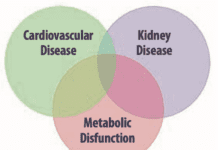Dreamstime.com


Poor sleep quality and diet may contribute to the early accumulation of the plaques associated with Alzheimer’s disease, according to a new review. Part of the reason may involve cortisol, a hormone manufactured by the body that plays a role in regulating many core functions, including sleep. Cortisol levels naturally rise and fall with day and night. But diets characterized by high intakes of refined sugars, salt, animal fats and animal proteins and by low intakes of fruits and vegetables can perturb the circadian levels of cortisol, leading to poor sleep quality. Improving your diet and sleep might reduce the risk of cognitive impairment and dementia.
“Lifestyle factors such as diet, physical activity and quality of sleep are all possible risk factors for dementia,” says Tammy Scott, PhD, an assistant professor at the Friedman School and scientist in Tufts’ HNRCA Neuroscience and Aging Laboratory. “The authors of this article make the case that a common mechanism may be through the dysregulation of cortisol release, which may in turn affect how the body clears misfolded proteins that are associated with Alzheimer’s disease.”
TAKING OUT THE TRASH: The review, published in Advances in Nutrition, notes that, independent of diet, sleep disorders and poor sleep quality have been found to be associated with a higher risk of Alzheimer’s disease. A good night’s sleep seems to be important for the brain to clear the misfolded proteins called amyloids that lead to the plaques and “tangles” associated with Alzheimer’s disease.
Unfortunately, pharmacologic treatments of sleep disturbances in Alzheimer’s patients have proven inconclusive. The risks associated with these treatments must also be balanced with any possible benefits.
So dietary changes to influence the body’s cortisol levels – and in turn promote good sleep – might be a safe and novel way to help protect the brain. The hippocampus of your brain, which plays a crucial part in memory, is also particularly receptive to cortisol. Your adrenal gland produces cortisol in response to stress and low concentration of blood glucose. Cortisol normally peaks in the morning as you wake up, then slowly declines during the day to an almost undetectable amount.
DIET PATTERNS: In the review, Francesca Pistollato, PhD, of the European University of the Atlantic, and colleagues suggest dietary changes that might help improve your body’s cortisol regulation. They note that typical Western diets can encourage the untimely release of cortisol, interfering with sleep. Diets rich in animal protein and salt and low in fruits and vegetables also tend to tip the body’s chemistry to acidic (“metabolic acidosis”), which can affect cortisol production.
Following a dietary pattern like that recommended by the American Heart Association might help: adequate intakes of fruits, vegetables, vegetable oils, whole grains and fish along with lower consumption of saturated fat, trans fat, dietary cholesterol, refined sugars and salt. So could the so-called Mediterranean diet.
INDIVIDUAL NUTRIENTS: The researchers also noted several specific foods and nutrients that might be linked to cortisol regulation:
– Flaxseed has been reported to reduce responses to stress and cortisol levels in some small studies.
– Phosphatidylserine (PS), a fat-like substance found naturally in cell membranes, especially in the brain, is extracted from soybeans and sold as a “memory-boosting” supplement. Though its effects are unproven, small, short-term studies have suggested a benefit. One study found that PS taken with omega-3s helped regulate cortisol levels.
– Magnesium deficiency is strongly correlated with insomnia.
– Potassium is important for adequate sleep duration.
– Sleep deprivation can cause a decrease of creatine in the brain, negatively affecting cognition and mood. Some preliminary studies have found that creatine supplements (5 to 20 grams daily) may protect against brain changes with aging.
It’s way too soon to head to the supplement aisle to test any of these theories, however. Fortunately, most of the changes that might help your cortisol rhythms, improve your sleep and protect your brain align with the dietary patterns experts already know promote good health in other ways. So if you’re looking for one more reason to eat right, let this intriguing brain bonus inspire you to make healthy changes.
TO LEARN MORE: Advances in Nutrition, July 2016 –
The National Sleep Foundation offers these recommendations for getting a good nights sleep:
– Alcohol, cigarettes and caffeine can disrupt sleep.
– Eating big or spicy meals can cause discomfort from indigestion that can make it hard to sleep. Avoid eating large meals for two to three hours before bedtime.
– Try a light snack 45 minutes before bed if youre hungry.
























